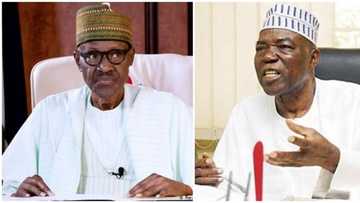Ken Saro-Wiwa: Britain rebuffed Mandela’s appeal for oil sanctions against Nigeria - Report
- A report has revealed how Britain rebuffed Mandela’s appeal for oil sanctions against Nigeria
- The government of the late General Sani Abacha had in November 1995, executed Saro-Wiwa and eight other Ogoni environmentalists
- Late former president of South Africa, Nelson Mandela, was said to have appealed to the British government to institute oil sanctions against Nigeria
A report by South African newspaper, Daily Maverick indicates that the British government rejected Nelson Mandela’s personal appeal to impose oil sanctions on Nigeria after its military regime executed Ken Saro-Wiwa and other eight Ogoni environmental activists in 1995.
Legit.ng gathered that the British wanted to protect oil company Shell’s commercial interests, newly declassified files reveal.
According to the report, the British files, released under the country’s declassification rules, showed that UK officials sought "to take some of the heat out of the sanctions debate” that raged after the hanging of Ken Saro-Wiwa and eight other members of Nigeria’s Ogoni community.

Read also
Jeremiah Useni discloses how President Buhari can secure release of all Boko Haram captives
It would be recalled that Saro-Wiwa had led a non-violent protest campaign against pollution by Anglo-Dutch company Shell and other energy firms in the oil-rich Niger Delta.
The so-called “Ogoni 9” were executed on November 10, 1995, following a military tribunal that was condemned internationally, especially by the late former South Africa president, Nelson Mandela.
Britain’s prime minister, John Major, had publicly criticised the executions, which he described as “terrible” and claimed he wanted to see “a fundamental and lasting change in the way Nigeria is governed.”

Source: UGC
The files showed that a day before the executions, British officials compiled a summary of UK investments in Nigeria, concluding that these were worth up to £5 billion.
Shell topped the list of “major UK investors”, producing half of Nigeria’s two million barrels per day output. The company was also said to be “interested in Nigeria’s gas reserves” and was on the verge of “the largest industrial project in Nigeria this century” one file states.
It was gathered that immediately after the executions, British officials listed possible international sanctions that could be imposed on Nigeria, ranging from a sporting ban to stopping arms exports.
However, under the heading “other options with greater risk to UK interests”, the officials listed a “freeze on financial assets of Nigerian leaders, trade sanctions” and an “oil embargo”.
The newspaper also noted that three days later, which was November 13, 1995, Sam Sharpe, the private secretary to foreign secretary Malcolm Rifkind, reiterated UK reservations about an oil embargo.
He told the prime minister’s office that “we believe we should hold in reserve for the time being any measures of this kind—which would of course place a disproportionate burden on the UK because of our close ties with Nigeria.”
According to the report, Mandela phoned the prime minister the following day, appealing to the UK to “cut off trade” with Nigeria in order to “exert real leverage”.
In response, Major told Mandela that “we would consider this” and that he “did not have a closed mind about trade sanctions."
But the files suggest Major was being disingenuous in his conversation with Mandela.
A briefing note prepared for the phone call by Oakden, his private secretary, reiterated senior officials’ reservations about an oil embargo, noting they “would not be enforceable” and that there was “strong UK commercial interest against this: Shell.”
It added that the foreign secretary “thinks we should try to hold the line” against sanctions.
Oakden’s summary of the phone call disparagingly referred to those “unhelpfully stirring the sanctions pot” and referred again to the “big UK commercial interests involved.”
The British government was said to have received a letter from Mandela on November 18, 1995, again urging Major “to take the lead in advocating oil sanctions.”
The prime minister was “not keen on the idea of oil sanctions”, another of his private secretaries wrote.
It was reported that when Major replied to Mandela on November 28, he reiterated that “we have not ruled anything out at this stage”, also suggesting that oil sanctions were unlikely to garner international support. Major did not mention British commercial interests in Nigeria.
PAY ATTENTION: Get the Latest Nigerian News Anywhere 24/7. Spend less on the Internet!
Meanwhile, Legit.ng had previously reported that details of how Ken Saro-Wiwa and eight leaders of the Movement for the Survival of the Ogoni People (MOSOP) were executed in prison emerged following narration from Ibrahim Abdulahi, a prison inmate who witnessed their hanging.
NAIJ.com (naija.ng) -> Legit.ng We have upgraded to serve you better.
Sowore: I'll join the street march if it holds again - 70-yr-old fufu seller | - on Legit TV
Source: Legit.ng


